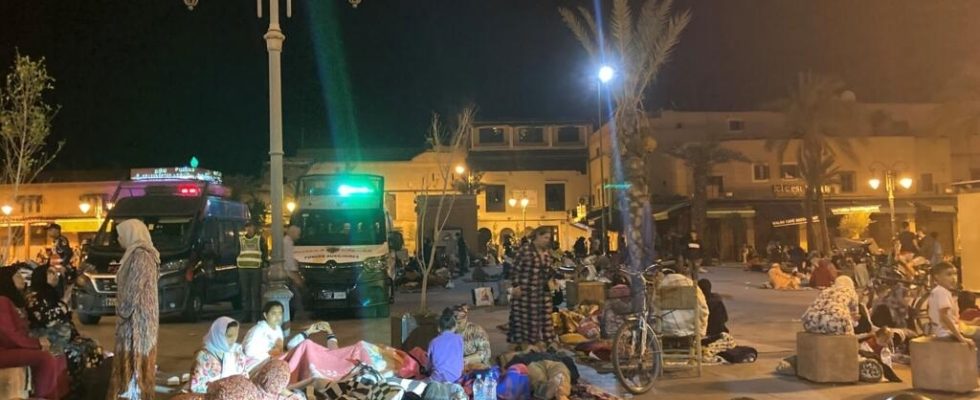A full-page photo on the front page of Parisian Sunday, that of a man walking in rubble, surrounded by partly collapsed walls, he carries a plastic bag in his hand, undoubtedly containing the only possessions he was able to save from the disaster. “ A tragedy “, ” a bruised kingdom “, headlines the newspaper, which echoes the immense surge of solidarity which immediately manifested itself … in Morocco and France. In Morocco first of all, in Amizmiz, for example, “ where vehicles registered in Rabat or Casablanca clutter the main street, trunks loaded with blankets, packs of water and food “. “ The city children are back »tell us le Parisien Dimanche“ at the bedside of their parents who have just lost everything… Thousands of villagers have a whole life to rebuild and no money… »
Solidarity also in France, where Yacine Laoudi, the rector of the mosque of Aulnay-sous-Bois, north of Paris, announced yesterday morning, “ the collection of financial and material donations… the donations could reach hundreds of thousands of euros “.
… A ” tragedy » in Morocco therefore, to which the Sunday Journal “ new formula », only gives a very small place. A single page in the middle of the newspaper, succinctly summarizing the situation. The JDD preferred to make its front page on France’s victory against New Zealand on Friday in the opening match of the Rugby World Cup.
In the weekly press, the coup d’état in Gabon raises a lot of comments…
“ France offside », headline on the front page The Express, above an outline of the African continent, on which is displayed a soldier in fatigues, a microphone in his hand, who seems to be haranguing a crowd. For The Obsit is now “ the time of the putschists “, “ the multiplication of coups d’état, which further weakens France’s influence on the continent, signals a worrying democratic decline “. “ France is not directly responsible for these putsches “, estimated The Express, but she should have distanced herself more from several authoritarian leaders. Instead, she practiced diplomacy with variable geometry, notably by anointing Mahamat Idriss Déby as leader of Chad in 2021, after the death of her father, in the absence of any democratic process. “.
The Express And The Obs both focus on the case of Gabon, the scene of the latest coup d’état, on August 30. “ Gabon, a French story “, title The Expresswhile on his side The Obs speaks of a “ French-African history “. In The Express, a few photos summarize Gabon’s proximity to France. Alongside Omar Bongo, then in recent years Ali Bongo, we see Pompidou, Giscard, Mitterrand, Chirac, Sarkozy, Macron. A relationship that is not disinterested, far from it… The Obs recalls it in a few lines: “ Gabon is rich: oil, manganese, uranium, tropical forests… clever financial arrangements fuel the coffers of the Bongo family, dignitaries of the regime, but also their French friends, including the political parties of the former colonizer , Bongo finances electoral campaigns, all campaigns, “except the communists”, he confided later. The Obs speaks of a “ toxic relationship which lasted more than half a century, until the coup d’état of August 30. L’Express, for its part, mentions the president of the transition, Brice Oligui N’guema.. “ A transitional president of whom Paris does not forget that he was the aide-de-camp of a friend of France, named… Omar Bongo “. “ France still has a foot in Gabon », concludes the weekly…
Coups d’état in Africa are also discussed in the Point…
In an interview with Wole Soyinka, the Nobel Prize winner for literature, now 89 years old. The Nigerian writer publishes a new book and he is questioned about the return to power of the military in Niger. “ They are traitors “, he exclaims, “ They should be tried for treason as soon as the time is right. but I must first admit that my generation, too, most often supported military takeovers”. “ At the timehe continues, the army seemed to us to be an organized, disciplined, let’s say disinterested, entity serving the country… but the military showed itself to be even more corrupt and naturally more brutal than the politicians. »
We finally open Mthe supplement of World…
With the portrait of a man whose name, Gérard Meudal, will probably mean nothing to you. At 73 years old, he nevertheless exercises a risky profession. For around fifteen years, he has been translating into French the works of Salman Rushdie, the author of Satanic Versesstill pursued by a fatwa and seriously injured a year ago, by the stabbings of a “ fanatic “, remember Mr. The writer’s translators are often threatened. His Japanese translator was assassinated in 1992. But Gérard Meudal was not impressed. “ I was asked to take a pseudonymhe explains, but I refused. Any person today is at the mercy of a fanatic. And I’m rather proud to translate Rushdie “.
